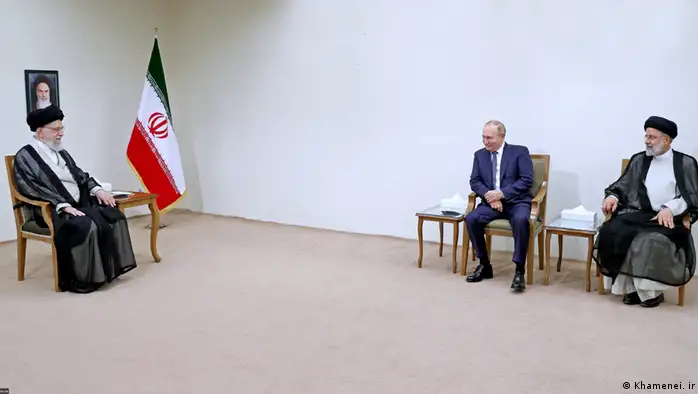Iran’s desire to maintain cooperation with Russia on various regional and international issues of common interest faces growing concerns within Iran itself. These concerns stem from Russia’s position on recent developments in Gaza, particularly following Israel’s escalated military operations against Hamas, triggered by Hamas’ “Al-Aqsa Storm” operation within Israeli territory on October 7th of the previous year.
While it’s not uncommon for different Iranian factions to express reservations about relying on Russia’s role in both international and regional matters, these concerns have gained prominence recently due to the perceived alignment between Russian and Iranian stances regarding Gaza events. This alignment became more evident after Russia criticized Israel, called for two United Nations Security Council resolutions for a ceasefire, and hosted a Hamas delegation led by Musa Abu Marzouk, a member of the political bureau, on October 26th of the previous year. This move led to Israel summoning the Russian ambassador in protest and issuing strong criticism of Russia’s policy towards the Israel-Hamas confrontation that began in the same month on the seventh day.
These Iranian concerns came to light during an interview with Ne’matollah Izadi, the former Iranian Ambassador to Moscow, conducted by the “Setareh Sobh” newspaper on October 30th of the previous year. In the interview, he remarked, “Russia appears to be exploiting the Gaza conflict to further its interests and objectives, despite a lack of evidence linking it to Hamas’ actions on October 7th of the past year.”
Around the same time, on November 1st of the current year, the “Ham Mihan” newspaper published a report titled “Russia’s Role in the Gaza Conflict,” asserting that Russia stands as the primary beneficiary of the ongoing conflict in the Gaza Strip. Several other media outlets, including the “Mehr” news agency, also emphasized the importance of enhancing coordination with Russia on multiple levels, particularly in the wake of the Gaza conflict. This was partially related to the visit of Assistant Foreign Minister for Political Affairs, Ali Bagheri Kani, to Moscow on October 27th of the previous year.
Multiple Motivations
The increasing debate surrounding the Russian stance on the war in Gaza can be explained in light of several considerations, the most prominent of which include:
- Shifting Focus from the Ukraine Conflict: Many assessments in Tehran indicate that Russia has significantly benefited from the Gaza war, which has had numerous international and regional consequences. One of its primary motivations was to divert attention from the ongoing conflict in Ukraine, which began on February 24, 2022, and is still ongoing. In response to the war in Ukraine, Russia has faced substantial Western pressure and sanctions aimed at compelling it to halt its military operations in Ukraine.
In this context, the military operation carried out by Hamas within Israel on October 7th of the previous year, followed by Israel’s military escalation within the Gaza Strip, played a pivotal role in easing the pressure on Russia regarding the Ukraine conflict. This encouraged Russia to become deeply involved in the developments of the Gaza war, whether through strongly criticizing Israel’s military actions or attempting to garner support in the United Nations Security Council for ceasefire resolutions, despite their failure to pass. Furthermore, Russia hosted leaders of the movement for discussions in Moscow, particularly focusing on the issue of Russian prisoners detained by Hamas.
The emerging warnings in Iran suggest that their expressed intentions aim to bring the attention of decision-makers to the potential “consequences” of continuing to serve Russian interests or relying on Russia’s role in the crisis until its resolution. Russia manages the crisis based on its own interests, regardless of whether they align with those of Iran or not.
- Amplifying Disputes between Western Countries and Ukraine: Moscow’s perspective indicates that the ongoing Gaza conflict could lead to the escalation of disputes between Western countries and Ukraine. This is particularly evident as Western nations, especially the United States, have rushed to provide political and military support to Israel. The United States, for instance, decided to deliver new military equipment to Israel and dispatched two American aircraft carriers to the Eastern Mediterranean, bringing them closer to the conflict zone. This shift in priority towards supporting Israel over Ukraine is notable, despite Russia’s ongoing military operations within Ukraine.
- Maintaining Communication Channels with Tel Aviv: Despite Israel’s expressed dissatisfaction with Russia’s stance on the Gaza war, it appears that Russia is reluctant to sever its communication channels with Israel. Two primary reasons underlie this decision. First, these channels ensure ongoing coordination between the two parties in addressing developments inside Syria, particularly Israel’s military strikes against Syrian regime targets, Iran, and its affiliated militias. Moscow perceives these strikes as a means to curtail Iranian influence on the ground, aligning with its own interests and calculations. Russia’s primary objective in Syria is to bolster its position as the dominant power capable of shaping political and security arrangements within the country.
- Dampened Prospects for a Nuclear Settlement: The eruption of the Gaza war has diminished the prospects for resolving the ongoing nuclear agreement crisis between Iran and Western countries. The likelihood of a settlement had increased following the Iran-United States prisoner exchange deal on September 18th of the previous year. However, Hamas’s initiation of the “Al-Aqsa Storm” operation, subsequent Israeli escalation, and Tehran and Washington taking opposing sides in the crisis have not only deferred the fate of this agreement but have also raised doubts about its continuity or the possibility of future negotiations. This aligns with Russia’s calculations as well, given previous accusations from Iranian parties that Russia obstructed access to the agreement during past periods, as Russia is not inclined to see a potential nuclear deal improve relations between Iran and the United States.
A Prudent Approach
Considering the circumstances, it is apparent that Iran aims to diversify its options for addressing the Gaza conflict. To achieve this, Iran should not solely rely on Russia’s role while also exploring avenues to maintain communication with the United States. This could be facilitated through intermediary parties or direct contact between both sides. One potential avenue could be Iran’s involvement in managing the issue of prisoners held by Hamas, including those with American citizenship.


